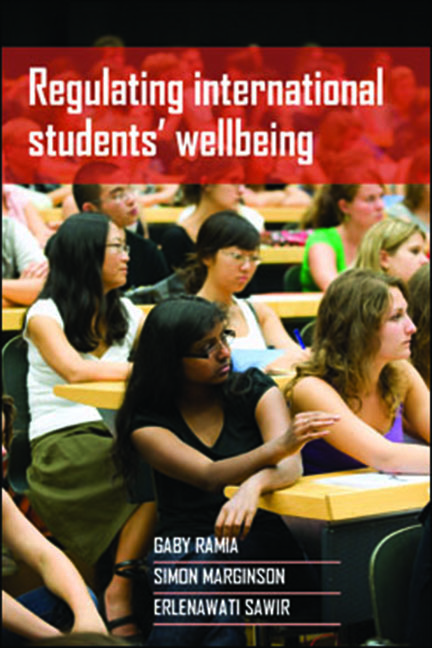Book contents
- Frontmatter
- Contents
- List of figures and tables
- Acknowledgements
- Preface
- one Introduction: global students and their discontents
- two Governing globalisation? National regulation and international student wellbeing
- three Fast growing, diverse: mapping the business of international education
- four ‘There’s gold in them thar students!’ Australia and New Zealand in the global market
- five Much regulation, minimal protection: the Australian model
- six Pastoral care, minimal information: the New Zealand model
- seven Different frameworks, similar outcomes: comparing Australia and New Zealand
- eight Doing it differently: national and global re-regulation and trans-national student citizens
- nine Conclusion
- References
- Index
Preface
Published online by Cambridge University Press: 03 February 2022
- Frontmatter
- Contents
- List of figures and tables
- Acknowledgements
- Preface
- one Introduction: global students and their discontents
- two Governing globalisation? National regulation and international student wellbeing
- three Fast growing, diverse: mapping the business of international education
- four ‘There’s gold in them thar students!’ Australia and New Zealand in the global market
- five Much regulation, minimal protection: the Australian model
- six Pastoral care, minimal information: the New Zealand model
- seven Different frameworks, similar outcomes: comparing Australia and New Zealand
- eight Doing it differently: national and global re-regulation and trans-national student citizens
- nine Conclusion
- References
- Index
Summary
Among the primary benefits of international education for nations receiving students, the host country, is the contribution to exports. Education across borders also facilitates international cultural exchange, and is a contributor to positive diplomatic and economic relations. If students return to their home country after completing their studies, an international education represents vital investment in intellectual capital. The importance of this is, of course, greatest for developing countries, from where a disproportionately large proportion of students hail. So, in the context of a global knowledge economy, both education exporters and importers stand to benefit. One of the many ingredients of an emergent cosmopolitan world and peaceful society must arguably be the phenomenon of students travelling from one country to another to pursue education. Students can make excellent unpaid ambassadors for their home country and culture, not just while undertaking studies but also in professional positions post-graduation.
International education offers mixed blessings, however. Few host countries provide adequately for the welfare of incoming students, who contribute enormously to the cultural and economic fabric of their host societies. One of our primary motivations in writing this book is our perception, backed up by analysis, that international students are too often constructed by policy makers as market participants exercising free choice, and not as people who, while internationally mobile, are nevertheless economically and socially vulnerable. Their vulnerability impels us to explore the moral questions surrounding the responsibilities of nations that profit so much economically. We seek to show how student vulnerability plays out, what it looks like, and more importantly, how the regulatory protections afforded international students in a host country are not true to the welfare services and provisions promised in legislation and accompanying documentation. We do not ignore students’ own responsibilities and agencies.
Our primary conceptual focus is regulation, both formal and informal, and our countries of central interest are Australia and New Zealand. These two nations benefit enormously from export revenues and indeed are among the world leaders on that score, but they do not deliver on the undertaking of the wellbeing of international students. Notwithstanding important and in the main well-founded news headlines alleging that international students have been victim to racism and exploitation in areas such as housing and employment, both Australian and New Zealand policy makers seem content to continue exporting services while not substantively attending to the human welfare deficits that too often beset markets.
- Type
- Chapter
- Information
- Regulating International Students’ Wellbeing , pp. vii - viiiPublisher: Bristol University PressPrint publication year: 2013

